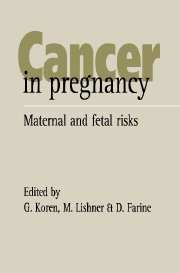Book contents
- Frontmatter
- Contents
- Preface
- List of contributors
- Part I Introduction
- 1 Cancer in pregnancy: identification of unanswered questions on maternal and fetal risks
- 2 The pregnant with malignant disease: maternal–fetal conflict
- 3 Changes in drug disposition during pregnancy and their clinical implications
- 4 The role of the placenta in the biotransformation of carcinogenic compounds
- 5 Antepartum fetal monitoring in the oncologic patient
- 6 The Toronto Study Group: methodological notes
- 7 Motherisk: the process of counselling in reproductive toxicology
- Part II Specific tumors during pregnancy
- Part III Fetal effects of cancer and its treatment
- Index
1 - Cancer in pregnancy: identification of unanswered questions on maternal and fetal risks
from Part I - Introduction
Published online by Cambridge University Press: 06 July 2010
- Frontmatter
- Contents
- Preface
- List of contributors
- Part I Introduction
- 1 Cancer in pregnancy: identification of unanswered questions on maternal and fetal risks
- 2 The pregnant with malignant disease: maternal–fetal conflict
- 3 Changes in drug disposition during pregnancy and their clinical implications
- 4 The role of the placenta in the biotransformation of carcinogenic compounds
- 5 Antepartum fetal monitoring in the oncologic patient
- 6 The Toronto Study Group: methodological notes
- 7 Motherisk: the process of counselling in reproductive toxicology
- Part II Specific tumors during pregnancy
- Part III Fetal effects of cancer and its treatment
- Index
Summary
When cancer occurs in pregnancy, there is almost always a conflict between optimal maternal therapy and fetal well-being. Consequently, either maternal or fetal health, or both, may be compromised.
Very sparse data exist on maternal outcome after cancer treatment in pregnancy. In addition, the literature on fetal outcome following maternal cancer is composed mainly of case reports. As a result, guidelines for therapy are based on very limited data, and often on few reported cases.
In this review, we analyze the available data regarding the impact of pregnancy on the course of cancer and the effects of the malignant process and its treatment on both the mother and her fetus. The purpose of this analysis is to identify areas where available data may allow clear conclusions as well as crystallization of questions which should have to be answered by future research.
Cancer in pregnancy
Cancer is the second most common cause of death during the reproductive years, complicating approximately 1/1000 pregnancies. The most common malignancies associated with pregnancy include breast, cervix, leukemia, lymphoma, melanoma, thyroid, ovary, and colon. Because of the current trend for many women to delay child-bearing, the association of these malignancies with pregnancy is likely to increase. In previous decades, pregnancy was discouraged in patients with a history of cancer. However, in the current era such pregnancies are supported with more optimism. Conception in a patient over the age of 35, or in any patient believed to have diminished child-bearing potential, is considered a “valued pregnancy”.
- Type
- Chapter
- Information
- Cancer in PregnancyMaternal and Fetal Risks, pp. 3 - 14Publisher: Cambridge University PressPrint publication year: 1996
- 2
- Cited by



